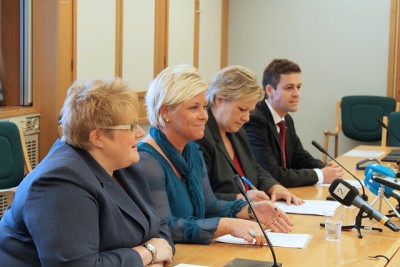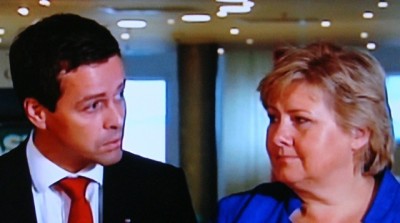It’s been called the most “explosive political drama” to play out in Prime Minister Erna Solberg’s government yet. A series of unsuccessful meetings this week has proven that negotiations over the government’s state budget proposal this year are even tougher than last year, threatening her minority coalition.

Suggestions were flying during radio debate Friday morning that Solberg may even need to seek support for her budget from unlikely quarters: among opposition parties like Labour and the Center Party that suddenly seem more cooperative than the government coalition’s two so-called “support parties,” the Christian Democrats and the Liberals.
Smashed are the hopes that serious disagreements over various issues close to the hearts of the individual parties involved would be avoided. Last year, Solberg’s Conservatives and Finance Minister Siv Jensen’s Progress Party had to cave in to some of the Christian Democrats’ and Liberals’ demands, to secure a majority in Parliament. All four claimed they wanted to appear more united this year. So far, they haven’t managed.
“The challenges are greater this year,” the Progress Party’s spokesman on financial issues, Hans Andreas Limi, told newspaper Dagsavisen on Friday. “We have external factors (beyond the government’s control) like an oil price cut by more than half, unemployment and economic challenges.”
What’s making everything “extra complicated” this year, Limi acknowledged, was receipt of the new supplemental budget proposal aimed at coming up with the huge amounts of money needed (currently an estimated NOK 9.5 billion, or well over USD 1 billion) to care for the thousands of asylum seekers who’ve been pouring into Norway since last summer.

That means the room for negotiations is “extremely little,” Limi said. “We simply have much less to offer.” The government has already dropped several of its tax relief proposals to save NOK 2.2 billion, but what continues to hang up talks is the government’s proposal to use NOK 4.5 billion from its foreign aid budget to help pay for all the aid now needed to provide for refugees who’ve made their way to Norway. Solberg and Jensen are proposing using a much lower percentage of Norway’s large foreign aid budget than many other European countries are, not least Sweden, to finance the refugee crisis that’s landed at their doorsteps. But the Christian Democrats especially remain firmly opposed to the reallocation, likening it to “making the world’s poorest people (recipients of foreign aid) pay for the refugee crisis.” Like-minded demonstraters rallied outside the Parliament earlier this week, as the budget meetings went on inside. They prefer to raise taxes, especially those on alcohol, fuel and tobacco, and make budget cuts in other areas.
The four parties are also arguing over how refugee aid itself can be pared down. The Conservatives have gone along with the Progess Party’s proposals to grant successful asylum seekers only temporary residence permits, not permanent. The want to make it tougher to become a Norwegian citizen, cut the “pocket money” granted to residents of asylum centers and provide lower standards of housing. Their two support parties are resisting much of that as well.
Warding off more ‘fear of foreigners’
It all adds up to what politial commentator Arne Strand called an “explosive political drama” for Solberg and Jensen, and a taste of what likely lies ahead. Norwegians are being warned that they need to decide now how much of the state welfare system they’ve built up for decades, and financed with oil revenues, they’re willing to share with the tens of thousands of asylum seekers expected by the end of next year alone. If the Christian Democrats and the Liberals don’t ultimately go along with the government’s budget proposal, Solberg and Jensen will need to seek majority support elsewhere, leaving them vulnerable to other demands. Ultimately, their government could fall.
Solberg said earlier this week that one of the reasons she supports more use of foreign aid funds to pay for refugees already in Norway is because she sees it as a means of reducing Norwegians’ fear of foreigners. That fear will increase, according to Solberg, if cuts are made now in Norway’s social welfare programs to finance more foreigners arriving in Norway. “We could have cut welfare programs, and raised taxes, but we think that will increase opposition to immigration much more than the changes we’ve made,” Solberg told newspaper Dagens Næringsliv (DN). “It would have created more tension within our society.”
Tension over the budget negotiations will continue instead, and the clock is running. A new budget must be agreed within the next few weeks. Solberg was cheered by a slight rise in public opinion polls for her Conservatives this week, at the expense of Labour. Since the mid-term municipal elections, though, her government also faces opposition local governments in place in a several more cities like Bergen and Tromsø. The challenges to Solberg’s government have boosted speculation that she may make some ministerial changes soon, to bring in some fresher faces that may boost popularity.
newsinenglish.no/Nina Berglund

